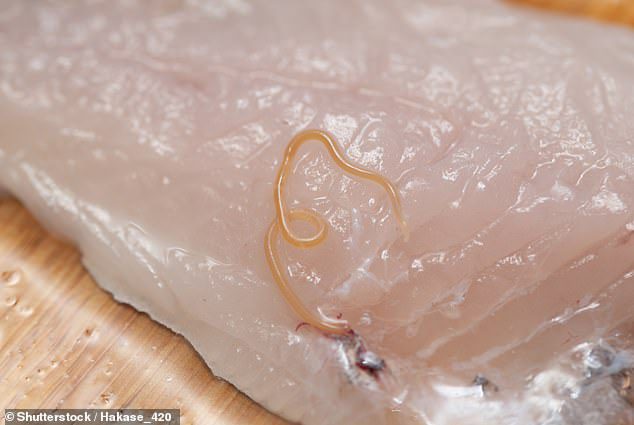
Health professionals are raising alarms about the potential dangers associated with consuming sushi, following the diagnosis of a parasitic brain infection in a tourist who visited Hawaii.
If raw fish is not adequately flash-frozen, it can harbor bacteria and parasites that lead to foodborne illnesses, resulting in symptoms such as severe nausea, vomiting, and diarrhea.
Nevertheless, the likelihood of contracting an illness from sushi served in U.S. restaurants remains low, thanks to FDA regulations mandating that fish intended for raw or undercooked consumption must be frozen first to eliminate parasites.
In contrast, the prevalence of parasitic infections from raw fish is more significant in other countries, primarily due to varying food safety standards and cultural practices.
The tourist diagnosed with this parasite traveled from New England to Thailand, Japan, and Hawaii. It’s still unclear whether her infection stemmed from raw fish, snails, or contaminated produce, all potential carriers of the parasite.
Parasites aren’t the sole concern for sushi enthusiasts, particularly outside the U.S. Raw or undercooked seafood may also contain listeria, vibrio, or salmonella.

Fish naturally carry parasites, but freezing is an effective method to eliminate them. Improper handling or thawing of sushi-grade fish can lead to the presence of these parasites.
The exact number of Americans who fall ill from sushi each year remains uncertain, as many individuals may not seek medical treatment, given that these conditions often resolve independently. Annually, an estimated 48 million Americans experience food poisoning, with 128,000 requiring hospitalization.
Dr. Brian Labus, an epidemiologist at the University of Nevada, Las Vegas, informed DailyMail.com: ‘Instances of illness from sushi are quite rare, but it’s essential to recognize that no food preparation method is entirely foolproof—things can still go awry.’
Certain fish naturally contain parasites, but these are typically eliminated through proper freezing methods. Sushi-grade fish must be frozen at -4 degrees for at least seven days or at -31 degrees for a minimum of 15 hours; failure to adhere to these protocols or mishandling increases the risk of parasites.
Rat lungworms, which are more prevalent in slugs and snails, are often found on the produce they come into contact with rather than in raw fish.
Anisakis worms, commonly present in fish, can lead to anisakiasis, resulting in severe gastrointestinal distress and symptoms like nausea and vomiting.
In some cases, individuals may experience digestive bleeding, bowel obstructions, or inflammation of the inner abdominal wall.
In Japan, known for its sushi culture, approximately 3,000 cases of anisakiasis are reported each year.
Dr. Labus noted: ‘The prevalence of these parasites varies based on fish availability. Different fish species carry different parasites, so the risk depends on both the type of fish and its source. Being far from the ocean can limit fresh fish options, making it less likely to find varieties that are prone to parasites.’
For instance, wild Pacific salmon is more likely to harbor anisakis or tapeworms compared to farmed salmon. Meanwhile, in landlocked regions such as the Midwest or Central Europe, seafood may be largely limited to frozen or imported options. While these can appear less ‘fresh,’ the added freezing actually reduces the risk of parasites, enhancing the safety of raw fish consumption in sushi dishes.

Sushi fish undergoes deep freezing upon being caught to eliminate parasites. This procedure ensures the safety of sushi consumption; if it were unsafe, it wouldn’t be permitted for sale.
Dr. Labus emphasized: ‘It’s crucial to understand that the raw fish used in sushi goes through thorough processing. Upon catching, we freeze it to kill any present parasites.’
‘So, while you’re enjoying uncooked fish, the deep-freezing procedure ensures that parasites are eliminated, making sushi safe to eat. If it posed a safety risk, establishments wouldn’t be allowed to sell it.’
The woman admitted to the hospital in Hawaii experienced a rare form of meningitis, which is the inflammation of the membranes surrounding the brain and spinal cord, after concluding a three-week tour of Thailand, Japan, and Hawaii.
At first, medical professionals suspected a nerve disorder, but further tests disproved this. Other potential causes, such as medication reactions, were also ruled out.
As her symptoms escalated, diagnostic tests confirmed a parasitic infection likely linked to consuming food contaminated with slime from snails or slugs. After a six-day hospital stay, she made a full recovery.
The precise route through which she contracted the worms remains elusive, but she primarily opted for street food and sushi during her travels.
Listeriosis, a serious illness caused by listeria, can also arise, particularly if fish is processed or stored under unsanitary conditions.
Vibrio bacteria are another potential contaminant in seafood, especially shellfish. While Vibrio parahaemolyticus can lead to gastrointestinal issues, Vibrio vulnificus can cause severe infections in the bloodstream, skin, along with swelling and septic shock.
While the majority of Vibrio infections are mild, some strains (like Vibrio vulnificus) can result in serious, life-threatening conditions, especially for individuals with compromised immune systems, liver disease, or diabetes.
Recent studies indicate a rising trend in parasitic worm infections. A 2020 research revealed that the incidence of Anisakis worms in raw or undercooked seafood has surged by over 280 times in the past four decades.
This increase in Anisakis parasites may reflect healthier marine ecosystems, but it poses risks to vulnerable species since marine mammals can spread the parasite via their waste. Experts emphasize the need for heightened public health awareness, as proper freezing or cooking of seafood effectively prevents human infections.









